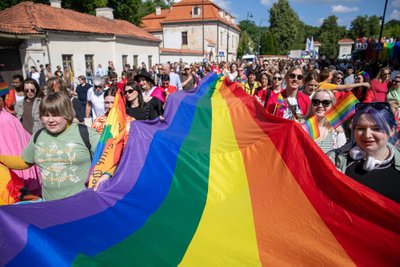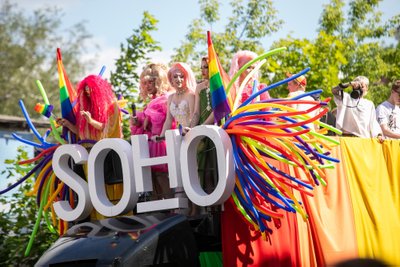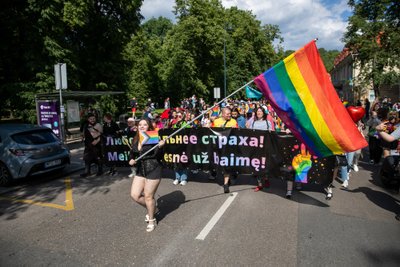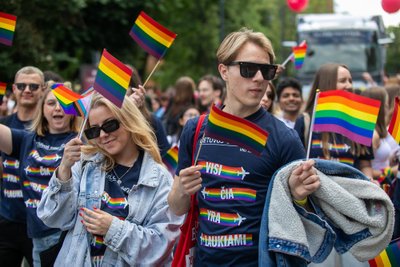Lithuania is Expected to Be Together With Western Countries
According to Eglė Kuktoraitė, Communications Manager at National LGBT Rights Organization, the International Day against Homophobia, Transphobia, and Biphobia aims at raising awareness about LGBT rights violations and encouraging interest in LGBT rights advocacy activities worldwide.
„May 17 was chosen to honour the World Health Organisation’s decision in 1990 to remove homosexuality from the International Classification of Diseases. In Lithuania, this day was first celebrated in 2007 with the „Rainbow Days“ events organised by the LGL,“ explains LGBT advocate Kuktoraitė.
The theme of this year’s International Day against Homophobia, Transphobia, and Biphobia is „No one excluded: equality, freedom, and justice for all“. According to Kuktoraitė, this day is important not only for the LGBT community but also for society.
„This day reminds us of the damage caused by the pathologisation of LGBT identities and the resilience of LGBT people in the face of hatred,“ she pointed out.

Kuktoraitė emphasizes that Western societies have already become aware of historical injustices against the LGBT community and have taken steps to accept them and guarantee LGBT human rights. The LGBT community in Lithuania wants the same progress, hoping that Lithuania will align with Western countries in terms of values.
„LGBT people in Lithuania face hostility, discrimination, hate speech, and bullying. There has been an increase in media attention to LGBT issues, especially in the context of civil unions. Sadly, these discussions have a negative impact on the LGBT community – exposes the community to hatred,“ said Kuktoraitė.
According to the Communications Manager at National LGBT Rights Organization, the LGBT community needs public respect and equal rights, not endless discussions.
„We hope that „The Lithuanian Pride“ festival in Vilnius on June 8 will give additional visibility to the LGBT community in Lithuania and unite those who support LGBT human rights,“ said Kuktoraitė.

Political Leadership – Main Condition for Progress to be Achieved
As Kuktoraitė points out, the world has recently celebrated the 75th anniversary of the Universal Declaration of Human Rights, a document that laid foundation for international law.
„The Universal Declaration of Human Rights guides us through a deeply divided world, sets values that everyone must follow, and serve as a compass showing the right way for those who seek social cohesion,“ said the Communications Manager at National LGBT Rights Organization.
According to Kuktoraitė, the experience of Western societies shows that the progress of LGBT rights is achieved through political leadership, and that society gradually accepts the guidelines defined in the law.
„The issues concerning minority rights cannot be resolved by majority consensus. In that case, in Lithuania unpopular decisions, like abolishing the death penalty, would never be reached otherwise,“ said Kuktoraitė.

She added that while preparing to join the European Union, Lithuania had adopted several important human rights decisions, ensuring equal workplace rights, protection against hate crimes, and other issues. It is hoped that such initiatives remain relevant and in today’s context.
„We did not rely on majority consensus then, which is why we enjoy the protection of our rights now. I hope Lithuania has political leaders who will take important human rights decisions without aiming at pleasing the electorate,“ said Kuktoraitė.
Some Members of the LGBT Community Do Not See a Future in Lithuania
According to Kuktoraitė, people under the age of 29 are relatively more tolerant and more liberal in terms of values towards members of the LGBT community.
„This generation grew up in a free Lithuania, they travel, and consume Western content on the Internet,“ she points out.
However, according to the Communications Manager at National LGBT Rights Organization, the problem is that this age group is less active in elections, and that strongly influences decision-making process.
„We can expect that in five or ten years we will be elect more human rights-oriented politicians from both sides of the political spectrum,“ adds Kuktoraitė.

According to the Communications Manager at National LGBT Rights Organization, the problem is that issues concerning the LGBT community, such as same-sex marriage, are now left to the discretion of member states, while Lithuania, for its part, should take more responsibility for addressing these issues.
„Lithuania, being a member state of the European Union, should once and for all set its values: are we fostering the values of former communist bloc countries, where rights are not equally granted, or are we finally able to join the family of Western values, where all are equal? Estonia and Latvia have already chosen. I hope that Lithuania will also make up its mind in this sensitive geopolitical context,“ hopes Kuktoraitė.
Unfortunately, when important issues are overlooked, more problems occur. For example, Kuktoraitė pointed out that some members of the LGBT community for certain reasons simply do not see their future in Lithuania.
„Some have already left Lithuania, and others, as our surveys of LGBT students show, are considering leaving after graduating. I wonder how many citizens Lithuania has already lost to homophobia, and how many more it will lose, and what impact this has on Lithuania’s GDP and demographics. Talented students and professionals are leaving our country. Some foreign-owned companies are not setting up in Lithuania because same-sex relationships are not recognised. Low-skilled workers from third countries would not compensate such loses,“ she said.
Kuktoraitė sent a very important message to the Lithuanian society and, in particular, politicians.
„I wish our politicians, who are concerned about the demographic situation in Lithuania, to guarantee the human rights of LGBT people, so that our people can return to their homeland and contribute to its prosperity,“ said Kuktoraitė.
Violence, discrimination, and hate speech in society – these are the problems that the LGBT community faces almost every day. This must stop. The International Day against Homophobia, Transphobia, and Biphobia is a great opportunity to consider the needs of the LGBT community and support them in the events marking this day.

